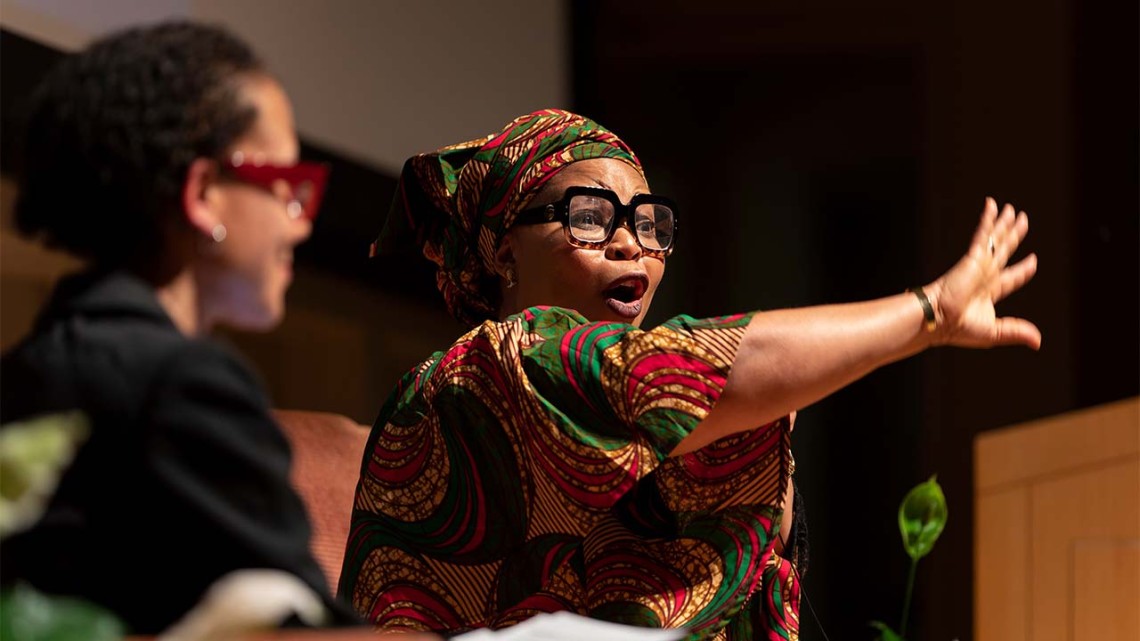
Leymah Gbowee delivers the Bartels World Affairs Lecture, May 3 in Alice Statler Hall.
Nobel laureate offers wisdom for forging lasting peace
By Caitlin Hayes
At an event years ago, activist Leymah Gbowee’s driver, a London-born Iraqi, told her that after 9/11 he felt that people viewed him as a terrorist.
“He said, ‘My identity is gone,’ and wanted to know how to live in a world like this,” said Gbowee, recipient of the 2011 Nobel Peace Prize, at the Bartels World Affairs Lecture, held May 3 in the Alice Statler Auditorium.
“We live in a time where our looks, our dress, the way we pray, the way we speak, has been used in so many instances to divide us,” Gbowee said. “These views of diversity have been used to create a politics of fear.”
These fears and divisions have led to violence and at times the most brutal wars – 22 deadly conflicts are ongoing, Gbowee said, and the amount of suffering is difficult to comprehend.
“Young people are losing faith in humanity, losing faith in our ability to bring the world to where we think it should come,” she said. “The question then becomes: How can we change the trajectory of the world?”
Gbowee’s answer – based on her years of experience as an activist, including her pivotal role in ending Liberia’s 14-year civil war in 2003 – is that we need to “bring people back in the center of everything that we do,” she said.
President Martha E. Pollack and Einaudi Center Director Rachel Beatty Riedl introduced Gbowee to a crowd of more than 450, with more viewers online, for the first in-person Bartels Lecture since 2019. In her talk, “Forging Lasting Peace: Movements for Justice in a Pluralist World,” Gbowee wove personal stories with what she sees as the tenets, the requirements, of successful peace-building movements – movements that not only end conflict but ensure dignity for all citizens.
“Peace is not just the absence of war but the presence of conditions that dignify us all,” Gbowee said. “If I’m able to send my child to school, go to the hospital. If I’m able to live decently, if I’m able to express myself. Today, there's a conversation here in the U.S. about reproductive health and rights – if I’m able to control my period, what I do with my body, that’s peace.”
Gbowee said an essential component of building a movement for peace is a community that sees diversity and difference as a strength. In the work cited for her 2011 Nobel Prize, Gbowee led an interfaith group of women in a resistance effort that helped broker an end to the civil war in Liberia. The women in her group followed her, she said, because of the committed, inclusive community they had built.
“At the heart of our movement was our commitment to enhancing the meaning of sisterly solidarity and expanding the concept of our collective humanity,” Gbowee said. “Whether you had political power or none, we were going to value each other and spend time in dialogue and find the space to give legitimacy to women’s concerns.”
Not only do movements need to create this inclusive community, they need to demand it from those they work with and those in power. Women, in particular, Gbowee said, need to be included at all levels of decision making. “You cannot build movements around issues when those that are being impacted by the issues are not factored into it,” she said.
Outside interventions for peace often fail, Gbowee said, because they don’t take cultural context into account, or they don’t embrace that larger definition of peace. They are often willing to pay for weapons but not the cost of rehabilitating the lives of those caught in the crossfire. This is another instance of needing to center decision making around people, Gbowee said.
Finally, Gbowee said forging lasting peace comes down to looking within our communities for what brings us together. She recounted her diverse, international community in graduate school convening for meals, having conversations where they overcame tensions and solved problems. “We live in a world today where we see peace and justice as Ukraine and Russia. We see human rights as something big out there,” Gbowee said. “But in order for us to begin to build movements, we must build communities right where we find ourselves.”
Gbowee said the main thing she did for that distraught British Iraqi years ago was to see him and his humanity. “Every single person in this room wants their humanity to be seen,” Gbowee said. “As you step out to transform this world, never let go of the question: I see your humanity, do you see mine?”
Gbowee is executive director of the Women, Peace and Security Program at Columbia University's Earth Institute, founder of the Gbowee Peace Foundation Africa and founding head of the Liberia Reconciliation Initiative.
The Bartels Lecture is hosted by the Mario Einaudi Center for International Studies and made possible by the generosity of Henry E. Bartels ’48 and Nancy Horton Bartels ’48. This year’s lecture was part of the center’s work on inequalities, identities and justice and was co-sponsored by Einaudi’s Institute for African Development and Reppy Institute for Peace and Conflict Studies, in cooperation with the nonprofit Peace is Loud.
Media Contact
Get Cornell news delivered right to your inbox.
Subscribe
